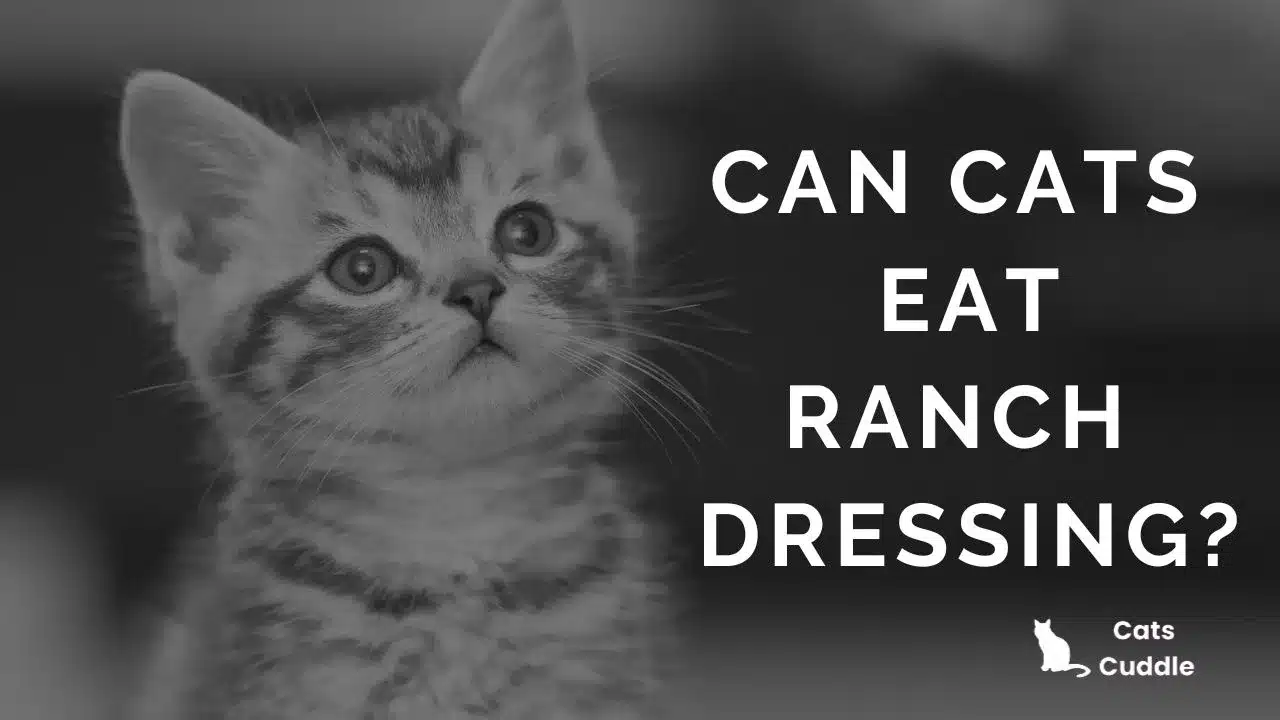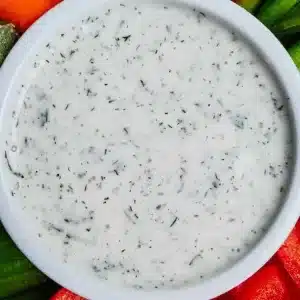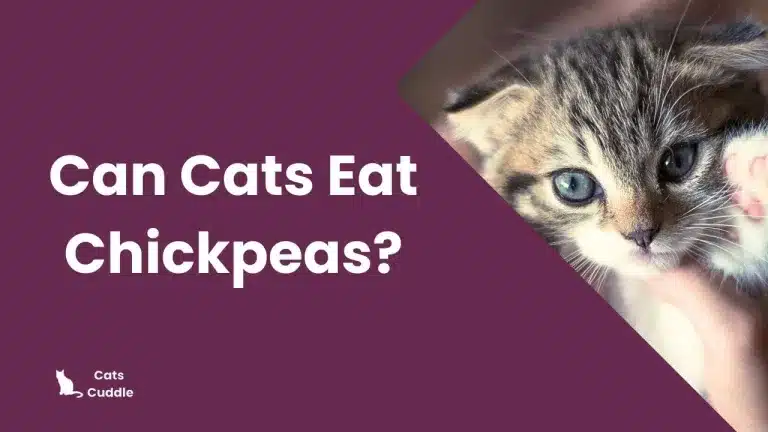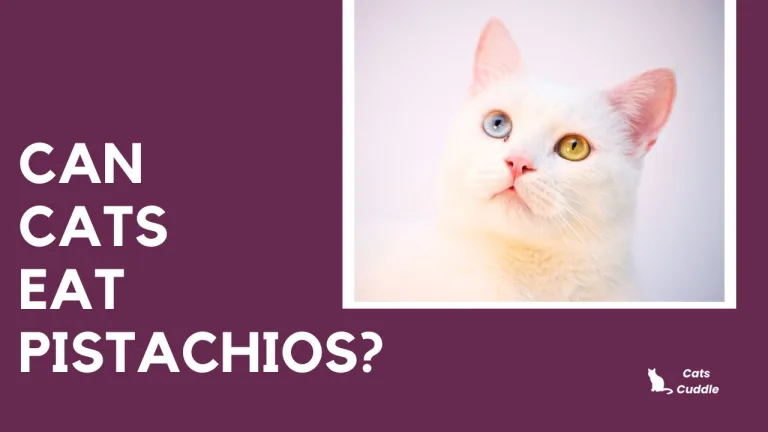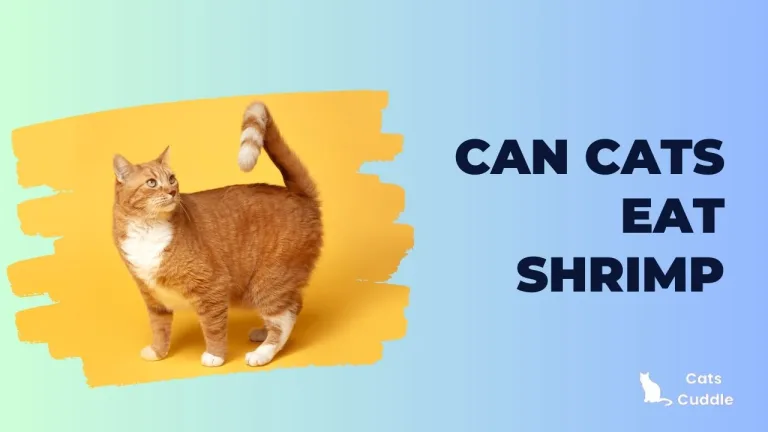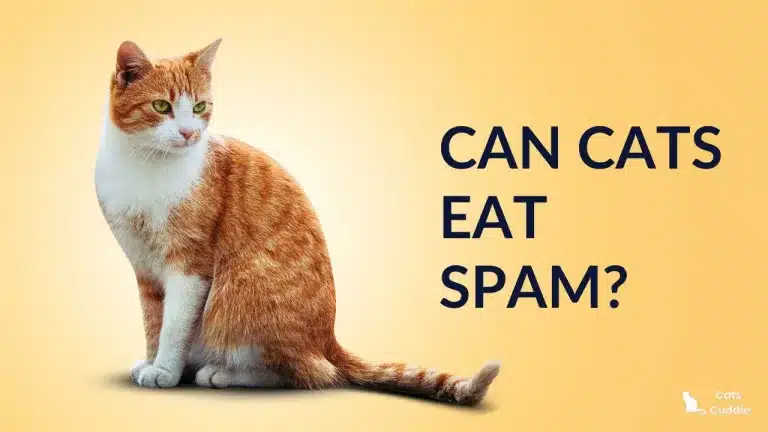Can Cats Eat Ranch Dressing? – Risks & Alternatives [2024]
Ranch dressing, a favorite condiment in many households, is often a subject of curiosity for cat owners. Its creamy texture and savory taste make it a hit among humans, but the question arises: Can cats eat ranch dressing?
With cats being part of our families, it’s crucial to understand what foods are safe for them to consume. In this article, we have described whether cats can eat ranch dressing and what potential risks it might pose to their health.
Cats should not eat ranch dressing due to toxic ingredients like onions and garlic, which can cause health issues like anemia. Many cats are also lactose intolerant, making the ranch’s dairy content problematic. Offer cats safe alternatives like cooked, unseasoned meats or specific cat-friendly snacks instead.
Can Cats Eat Ranch Dressing?
The straightforward answer is no, cats should not eat ranch dressing. The primary concern lies in the ingredients commonly found in ranch, such as onions, garlic, and chives, which are known to be toxic to cats.
These ingredients can cause serious health issues, including gastrointestinal upset and even damage to red blood cells, leading to anemia. Moreover, many cats are lactose intolerant, and the dairy components in ranch, like buttermilk and sour cream, can lead to digestive distress, including diarrhea and stomach discomfort
Risks of Feeding Ranch to Cats
Feeding ranch to cats introduces several risks, primarily due to the toxic ingredients it contains. Onions, garlic, and chives, common in ranch dressing, pose significant threats.
Even in small amounts, these can cause oxidative damage to cats’ red blood cells, leading to a condition known as Heinz body anemia. This condition reduces the ability of red blood cells to carry oxygen, potentially leading to weakness, lethargy, and in severe cases, organ damage or death.
Additionally, the high lactose content in ranch can be problematic, as many cats are lactose intolerant. Ingesting dairy can cause gastrointestinal issues such as flatulence, diarrhea, and stomach pain in these cats.
Ranch dressing also contains other harmful elements like high levels of sodium, fats, and possibly monosodium glutamate (MSG), which can negatively affect a cat’s health, causing increased thirst, urinary problems, and appetite changes.
What If Your Cat Eats Ranch?
If your cat accidentally consumes ranch dressing, it’s important not to panic but to monitor its health closely. Small amounts may not cause immediate harm, but it’s crucial to watch for symptoms like vomiting, diarrhea, or signs of gastrointestinal distress.
If any of these symptoms appear or if the cat has ingested a significant amount, contacting a veterinarian promptly is essential for advice and possible treatment.
In cases of ingestion, removing any remaining ranch or foods containing toxic ingredients like onions and garlic from the cat’s reach is vital. Keep an eye on the cat’s behavior and health in the next 24 hours, looking out for any changes or signs of discomfort.
For larger quantities consumed or if any concerning symptoms develop, seeking veterinary care immediately is crucial. The vet may need to perform treatments such as inducing vomiting, administering activated charcoal to absorb toxins, or providing supportive care like fluids and medications to address symptoms and prevent dehydration.
Safe Alternatives to Ranch Dressing for Cats
Finding suitable and safe alternatives to ranch dressing for cats is important to satisfy their taste buds without compromising their health. Since ranch contains ingredients harmful to cats, it’s better to opt for snacks that cater to their dietary needs.
Cats are obligate carnivores, requiring a diet high in protein and low in carbohydrates. Instead of ranch or other human condiments, consider offering your cat small portions of cooked, unseasoned meats like chicken, beef, or tuna.
Homemade treats can be a healthier option, ensuring you control the ingredients. For instance, plain cooked chicken or fish, free from any seasoning or sauces, can be a delightful treat for your feline friend.
Additionally, some cats may enjoy a small amount of plain yogurt, particularly those who are not lactose intolerant. However, it’s always best to introduce any new food gradually and in moderation, monitoring your cat for any adverse reactions.
Frequently Asked Questions (F.A.Q)
Why is ranch dressing harmful to cats?
Ranch dressing contains ingredients like onions, garlic, and chives, which are toxic to cats and can lead to red blood cell damage and anemia. Additionally, the lactose in ranch can cause digestive issues in lactose-intolerant cats.
What are the symptoms of ranch dressing toxicity in cats?
Symptoms can include vomiting, diarrhea, lethargy, pale gums, rapid or labored breathing, and in severe cases, organ damage or failure. Immediate veterinary attention is required if these symptoms are observed.
Can cats have any dairy products safely?
Some cats may tolerate small amounts of dairy, but many are lactose intolerant and can experience digestive issues like diarrhea and stomach pain from consuming dairy products. It’s best to avoid giving cats dairy in general.
What should I do if my cat eats ranch dressing?
If your cat consumes ranch dressing, observe them closely for any signs of distress. For small amounts, monitor for symptoms and contact your vet if they appear. For larger ingestions, seek immediate veterinary care.
What are some safe and healthy snacks for cats?
Safe snacks for cats include small portions of cooked, unseasoned meats like chicken, beef, or fish. Plain-cooked vegetables or a small amount of plain yogurt (for cats that can tolerate lactose) can also be offered. Always ensure that the snacks do not contain toxic ingredients like onions or garlic.
Wrapping Up
In summary, while ranch dressing is a beloved condiment for many, it is not suitable for cats. The presence of toxic ingredients like onions, garlic, and chives, along with lactose and other unhealthy additives, makes ranch a risky choice for feline consumption. Cats, being obligate carnivores, require a diet that is vastly different from humans, focusing primarily on high-protein, low-carbohydrate foods.

